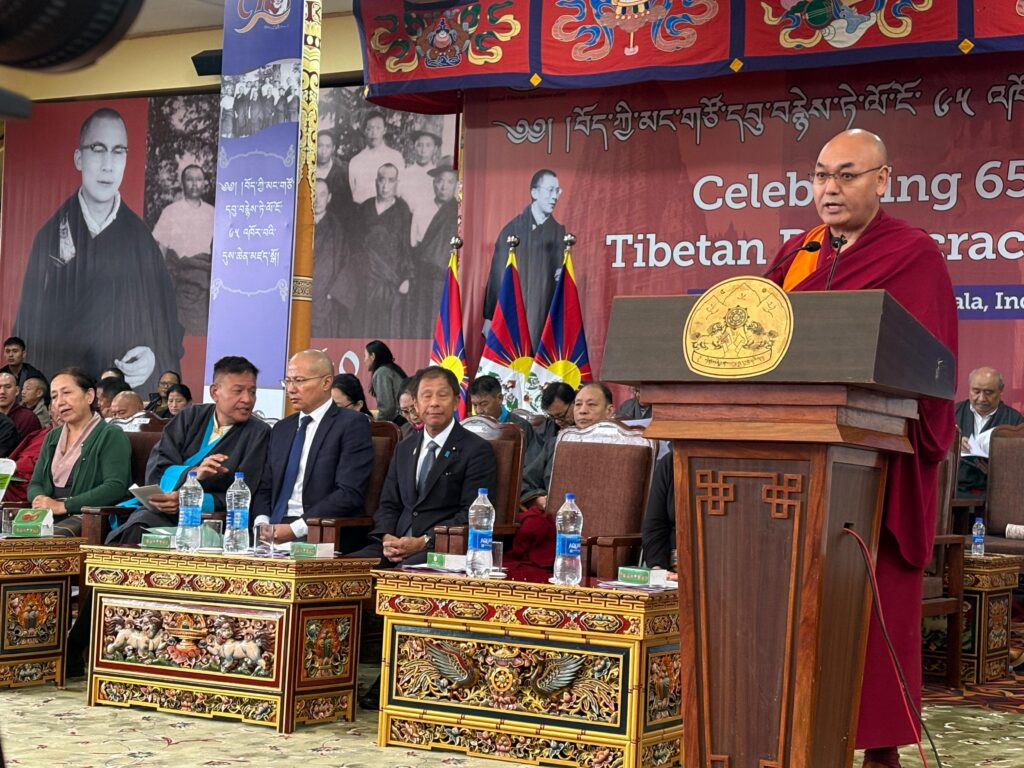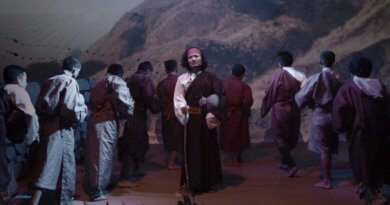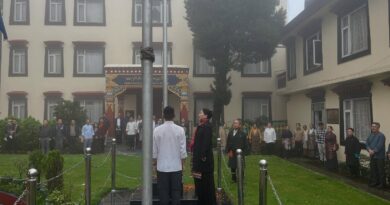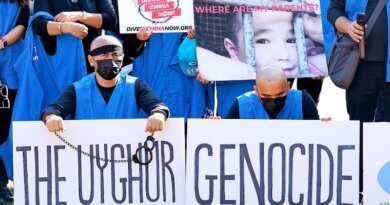Statement of the Tibetan Parliament-in-Exile on the 65th Anniversary of the Tibetan Democracy Day
2 September 2025

Today marks a momentous occasion—the 65th anniversary of the establishment of Tibetan democracy. It is also a day to remember with deep reverence the boundless kindness of His Holiness the Dalai Lama, the supreme leader of Tibet, for bestowing upon us the precious gift of a truly democratic system for the benefit of Tibet and the Tibetan people.
On this occasion, when we are in celebration of the 90th birthday of His Holiness the Dalai Lama, the apostle of love and affection, and the protector of all sentient beings of this world in general and of the Snowland of Tibet in particular, we wish to express utmost sense of gratitude to him with body, speech and mind obeisance on behalf of all Tibetans – those who remain in Tibet as well as those who live in exile.
A democratic society is recognized as one in which everyone is treated equally, without discrimination based on power or status, wealth or poverty, gender, race, ethnicity, or any other factor. Throughout history, in many countries around the world, ordinary people have made great sacrifices in the struggle to establish democracy. However, the invaluable democratic system of the Tibetan people—remarkable in its form— was a generous gift from His Holiness the Dalai Lama. It reflects the greatness of his noble vision and profound compassion.
In this respect, it bears remembering that in the year 1949, the army of the communist Chinese government began its armed invasion of Tibet, leading to a critical and urgent political situation in the country. At that time, His Holiness the Dalai Lama was only 16 years old. Nevertheless, he was compelled to assume the responsibilities of both the temporal and spiritual leader of Tibet. This historic event took place on November 17, 1950.
At the same time, His Holiness launched reform measures to modernise the prevailing system in Tibet, for which purpose he set up a Reform Office in 1954. Then, in 1956, His Holiness set up, for the first time, a Public Grievances Investigation Department where ordinary Tibetans could file complaints to seek the prosecution of official wrongdoings in an effort to ensure the progress and wellbeing of the Tibetan society. Tragically, this period also witnessed an escalating pattern of repression by the occupying Chinese military forces, whose actions grew increasingly brutal with each passing day. Ultimately, the deteriorating situation forced His Holiness the Dalai Lama to leave Tibet on the night of March 17, 1959, accompanied by his retinue. His purpose in seeking political asylum in the neighbouring holy land of India was to continue working for the restoration of Tibet’s political and religious freedoms.
Immediately upon arriving in exile in India, His Holiness the Dalai Lama took on the great responsibility of working toward a transformed system of governance for the future of Tibet—one that would be in harmony with modern democratic principles. On February 3, 1960, representatives from all three provinces and the major religious schools of Tibet offered him a long-life ceremonial tribute in the Holyland of Bodhgaya. Alongside this, they presented a powerfully composed oath of unwavering and solemn allegiance to his leadership.
At that time, His Holiness told the gathering, “It is important that unlike in the past, the government of Tibet should be a politically and religiously informed democratic one. This means that we should have a parliament whose deputies represent the broad masses of the Tibetan public elected on the basis of majority vote by them. For the time being, this parliament can consist of one deputy from each of the four major religious schools and three deputies each from the three provinces. So, once you get back to your respective places, you must present to me lists of names of candidates decided upon by whatever number of people there are who are learned and capable, patriotic and selfless, and who are worthy of being believed and trusted by their electoral constituencies.” It was pursuant to this advice from His Holiness the Dalai Lama that members of the first Commission of Tibetan people’s deputies were appointed with their letters of appointment signed by him. And they took their oath of office on September 2, 1960, marking the historic establishment of Tibetan democracy.
Likewise, out of great consideration for the immediate and long-term wellbeing of the Tibetan people, His Holiness continued to issue a series of visionary advisories. These combined the positive elements of Tibetan culture and tradition with the values of modern democratic governance. His guidance laid the foundation for the Tibetan Government in Exile, a political system grounded in the principles of freedom, equality, justice, and peace—principles that have come to define the excellence of Tibetan democracy.
Later, in 1961, His Holiness announced an outline of a future democratic constitution of Tibet. This was followed, in 1963, by the promulgation of a constitution of Tibet. Later, in 1991, His Holiness took a significant step forward by transforming the Assembly of Tibetan People’s Deputies into a fully empowered legislative body in exile.
On 28th of June 1991, His Holiness gave his assent to the Charter of Tibetans in exile, which had been adopted by the 11th Tibetan Parliament-in-Exile. By this, His Holiness ensured that the Tibetan government in exile became one which functioned under a basic law and in accordance with democratic principles. This charter established that the Central Tibetan Administration would operate based on laws, rules, and regulations passed by the Tibetan Parliament-in-Exile—effectively instituting a democratic system governed by the rule of law.
Following these developments, in 2001, the Kalon Tripa—the executive head of the Central Tibetan Administration—began to be directly elected by the Tibetan people, as envisioned and directed by His Holiness the Dalai Lama. This was a major democratic milestone. Then, in 2011, His Holiness made an even more historic decision: he formally renounced the nearly 400-year-old tradition of temporal authority held by the Gaden Phodrang institution, thereby transferring all political power to leaders directly elected by the Tibetan people.
Through these transformative steps, His Holiness ensured the establishment of a democratic administration and parliament that are fully representative of the Tibetan people, both inside Tibet and in exile—institutions capable of shouldering the full responsibilities of governance. That our governmental system now functions entirely within a democratic framework, and that this democratic foundation supports and sustains our ongoing struggle for the just cause of Tibet, is truly a matter of both pride and profound significance.
His Holiness the Dalai Lama has not only blessed the Tibetan people with a democratic system that continues to thrive and flourish, but also ensured that the religious heritage, culture, language, and so forth which define our Tibetan national and ethnic identity continue to remain vibrant.
Despite ongoing pressure and the continuous spread of false propaganda by the Chinese government on the international stage, many governments, parliaments, and organizations
continue to extend their support and assistance to Tibet and the Tibetan people. This enduring solidarity is a testament to the noble efforts and compassion of His Holiness the Dalai Lama.
For the future too, thanks to His Holiness the Dalai Lama and the fully democratic system of the Central Tibetan Administration located at Dharamshala in the holy land of India, hopes remain high that Tibet and the Tibetan people will continue to draw interest and support, with the situation in Tibet remaining a matter of great global concern on a sustained basis, so that the Tibetan people in Tibet and in exile may finally be reunited.
The communist government of China has never abandoned the implementation of its vicious policy to eradicate the religious, cultural, linguistic and so forth identity of the Tibetan people. In fact, it still continues to bring into play ever more brutal and worse policies for these purposes. On the other hand, over the last many decades, His Holiness the Dalai Lama has continued to provide suggestions for the resolution of the Sino-Tibetan conflict through negotiations. However, not only were these unpalatable to the ears of the Chinese leaders but also the government of China had never stopped even to this day its highly repressive policy of routinely harassing and tightly controlling all aspects of the movement and behaviour of the Tibetan people and other ethnic minority people under its authoritarian rule. Nevertheless, the Tibetan people in Tibet have remained steadfast in their ethnic identity and loyalty. This has been a source of reinforcement for the courage and determination to the Tibetan people living in exile.
The general elections for the next Sikyong and the Tibetan Parliament-in-Exile are scheduled to be held in 2026. In preparation, the Tibetan Election Commission will announce the schedules for the preliminary and final polls in due course. All Tibetan people living in exile who participate in these elections must pay close attention and exercise due care throughout the process.
A primary concern is that the Chinese government frequently attempts to create unrest and sow discord within our exile community. It is essential that Tibetans remain vigilant and avoid becoming unwitting tools in such nefarious schemes. Similarly, we must reject the divisive rhetoric of a few thoughtless individuals who promote provincialism and sectarianism, stirring communal turbulence through the internet and other social media.
Instead, everyone should act with discretion, relying on their own judgment and ensuring that our traditional Tibetan values of morality and good conduct are upheld. We therefore appeal to all members of the community to act responsibly and adhere strictly to our election rules. It is our collective responsibility to conduct ourselves with integrity as we exercise our democratic rights in these upcoming elections.
With regard to the work of the 17th Tibetan Parliament-in-Exile, one important point worth highlighting is that all the members acted with solidarity, enabling timely amendments to the Charter of the Tibetans in exile as well as to other relevant legislations. As a result, the normal functioning of the Central Tibetan Administration was sustained, including the full restoration of the operations of the three pillars of Tibetan democracy and the various autonomous bodies. Besides, on many issues, the legal and regulatory provisions could be made more lucid.
Similarly, the 8th and 9th World Parliamentarians’ Conventions on Tibet were successfully held in Washington, D.C., in 2022, and more recently in June this year in Tokyo, Japan. In addition, members of the Tibetan Parliament-in-Exile were divided into equally sized groups and sent on advocacy visits to various foreign countries to garner international support for the Tibetan cause.
Through these initiatives and other outreach programs, the Tibetan Parliament-in-Exile was able to raise significant awareness and generate meaningful support for Tibet on a global scale. Parallel efforts were also carried out within India, focusing on lobbying members of the national Parliament, state legislative assemblies, and other influential figures. The outcomes of these efforts have been equally impactful and commendable.
As part of this year’s programme to commemorate the 90th birthday of His Holiness the Dalai Lama—and in conjunction with today’s celebration of Tibetan Democracy Day—the Tibetan Parliament-in-Exile is organizing a photo exhibition showcasing His Holiness’s major contributions to the development of Tibetan democracy.
The exhibition is being held in the courtyard of Thekchen Choeling Tsuglakhang, opening today and remaining on display for three days. We warmly invite everyone to visit and reflect on this important legacy.
On this special occasion, we also take the opportunity to express our heartfelt gratitude to the government and people of India, our gracious hosts, and to all supporters of the Tibetan cause around the world—including those in the United States, Europe, Japan, and beyond—for their continued and unwavering support for our just struggle.
In conclusion, we fervently pray that His Holiness the Dalai Lama, the protector-deity of all beings in the three realms, and especially of us of the Snowland of Tibet, may live for a hundred aeons, and that all his wishes may be seen fulfilled spontaneously, without any obstacles, and that the truth of the cause of Tibet may prevail soon.
By the Tibetan Parliament-in-Exile
2 September 2025
……………………………………………………………………………………………………………………………………………………………………………………………………….
*In case of any discrepancy between this English translation and its Tibetan original, the latter should be considered as authoritative and final for all purposes.






